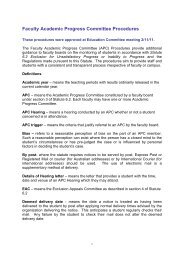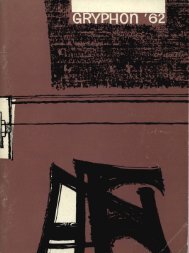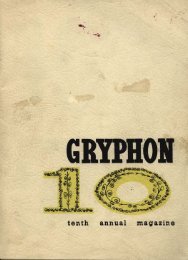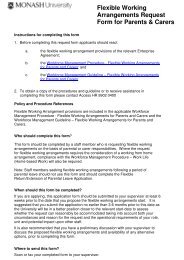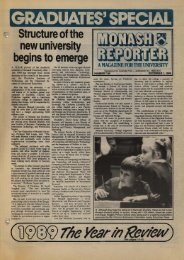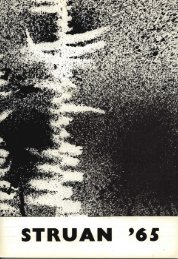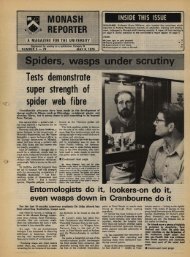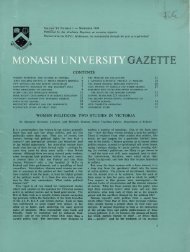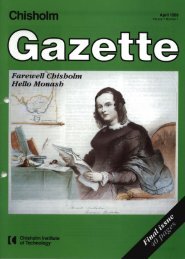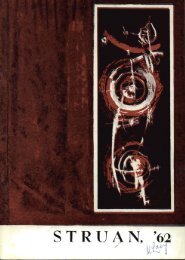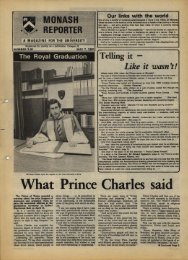MONASH UNIVERSITY GAZETIEMUSIC ON HIGHBy T. A. Jones, Professor of MusicWhen the chair of Music at this <strong>University</strong> was establishedin 1964, the advertisement for it stated that "it isnot intended to establish a conservatorium or to providetraining for professional performers", but rather "tointroduce within the faculty of Arts courses in musicat both pass and honours level, with emphasis on thehistory of music and analysis of musical forms". Thoughmany people thought then, as they do now, that this wasa cripplingly narrow and misguided approach to music,I believed then, and continue to believe, that the underlyingphilosophy implied was both right in general termsand peculiarly applicable to the special position of<strong>Monash</strong> as Melbourne's second university. Without heregoing into the pros and cons of whether or not professionalperformance and composition are truly academicfunctions of a university, experience has shownthat they are nowadays so demanding of time and effortthat the serious study of musical history, style, criticismand scholarship, let alone of non-musical subjects, is virtuallyprecluded. Thus it seemed logical and desirable for<strong>Monash</strong> to develop a department of Music that wouldoffer a genuine alternative to the specialized and essentiallyprofessionally and vocationally oriented courses inmusic already available at Melbourne <strong>University</strong>. Considerationsof finance, staff and space supported such anapproach, but did not determine it.The department of Music is now well into its thirdyear of operations. at the top of the Menzies building,and although the first Arts graduates with a major orhonours in music have not yet completed their work itis possible to see some of the results of this approach.The major facilities that have been developed in the departmentare the Music Laboratory, the Sound Laboratoryand the Ethnomusicological Research Laboratory.The Music Laboratory, in addition to housing an extensivecollection of records and scores, has a modifiedlanguage laboratory comprising twenty-two listeningbooths, each equipped with record-playing and taperecorderfacilities and interconnectable in a variety ofways. Here students may listen to records or tapes,copy records onto tapes and carry out programmed instructionwork in <strong>au</strong>ral training, as well as use scoresin the reading room, and the help of a music librarianis available to them. The Sound Laboratory contains avariety of electronic equipment for recording music andfor copying, editing and reproducing recorded music,including a "Tempophon" offering independent variationof pitch and tempo of tape-recorded music. The EthnomusicologicalResearch Laboratory, equipped and staffedthrough grants from the Australian Institute of AboriginalStudies in Canberra, acts as a research and documentationcentre for the study of Australian Aboriginalmusic, and a research fellow and research assistant wittshortly be joined by a specialist lecturer in Etbnomusicology.Musical instruments at present include onegrand and eight upright pianos and a small harpischord,but we hope greatly to expand this collection beyondkeyboard instruments in the near future.Among the unique (in Australia) or unusual aspectsof the department's course work are the lack of anyformal special prerequisites, the use of programmed instructionmaterials, the ethnomusicological influence, andthe emphasis on analysis rather than imitative compositionas the basis of stylistic studies. We decided at theoutset that to impose some kind of prerequisite for entryinto Music I was both undesirable and unnecessary.Students who. for a variety of reasons, had undergonelittle or no formal musical instruction before coming to<strong>Monash</strong> deserved, we felt, an opportunity to discoverand extend whatever latent talents in musical understandingthey might have. and should not have the doorslammed in their faces in order to restrict our enrolmentsto a hypothetical elite. We also doubted the valueof certain public examinations in music, including thematriculation examinations, as indicators of achievementor predictors of future success. The results, in our firsttwo years of teaching, of this permissiveness speak forthemselves: in 1966. out of twenty matriculants in musicwho took Music I only eight passed, while fifteen out oftwenty-eight non-matriculants in music passed; in 1967,the pass rate for matriculants was fourteen out of sixteen,and for non-matriculants sixteen out of eighteen.Despite the greater difficulties of teaching placed on usby this decision, therefore, we already have good reasonsto believe that it was the right one. We do, however,place the onus of rapidly acquiring basic skills andfactual knowledge on students who are seriously deficientin them, and we have found that this onus is cheerfullyaccepted when they realize that they are, in a real sense,lucky to be accepted into Music I.Closely related both to our freedom of entry and tvour dissatisfaction with much secondary <strong>edu</strong>cation inmusic is OUf experience with programmed instruction in<strong>au</strong>ral training. In courses such as ours no less than inconservatorium work, <strong>au</strong>ral perception of a high orderis essential, yet it is almost universally either neglectedor bungled. Using a system based on recorded tapes andprogrammed texis developed by Professor James Carlsenin the U.S.A., most of our students in their first yearacquire a degree of trained perceptiveness that is not alittle astonishing. The system, as we use it, develops arapid response to melodic and rhythmic patterns, accurateretention, and notational skill in reproducing theseheard and remembered patterns on paper, as well as theability to notice any discrepancies between music asnotated and performed. We administer a preliminarytest at the beginning of the year, which almost all (includingmatriculants in music) fail. At the end of theyear a similar test is administered, and so far an averageof seventy per cent have passed, with many studentsachieving very high scores. The difference between theresults of matriculants and non-matriculants is of theorder of only ten per cent. We ourselves know perfectlywell that we were t<strong>au</strong>ght by, graduated with, and subsequentlyworked alongside, musicians some of whomcould not have passed these tests, and we feel that amajor breakthrough has been achieved by providing anefficient means not only of training ears as they shouldbe trained but of weeding out the unfortunate few studentswho apparently cannot respond to, and thereforeshould not proceed with, further musical training, Suchstudents are not deprived of Music I, but their acceptance4
•into subsequent years is restricted according to theirlevel of performance in these tests.It is too early to judge whether our frankly experimentaldecision to replace the traditional exercises in"harmony", "counterpoint", "fugue" and "orchestration"with intensive analysis is completely successful. Experienceelsewhere had convinced us that the olderapproach not only took up an inordinate amount of theaverage student's tirne (and therefore severely restrictedThe Sound Laboratory, showing harpsichordthe scope of courses) but often proved largely irrelevantto his overall understanding of style, history and structure.In first year our students are introduced to thetechniques of analysing music from various ccmpositionalaspects, and in later years these aspects are selectivelystudied at far greater depth. We have found thatwe have to rely on our own methods (which, incidentally,we ourselves were not adequately t<strong>au</strong>ght) in thisfield, since we are working in an area largely devoid of<strong>au</strong>thoritative textbooks. Analysis as an essential criticaland scholarly tool is our aim.The ethnomusicological approach is making its markon many aspects of our course work without in any waydenying or weakening the importance of our Europeancultural heritage. Students are encouraged from the outsetto think of music as a universal, though not anabsolute, phenomenon, and it is expected that this influencewill continue to widen and deepen as ourhonours and graduate studies in this science expand.Some special attributes of the various subjects t<strong>au</strong>ghtin the department may be mentioned briefly bec<strong>au</strong>sethey represent a departure from common practice. Overand above the solid core of historical, critical andanalytical studies that one would expect to find in suchcourses, Music I begins with a thorough introduction toacoustics and the basic physics of music, subjects amasterpiece of twentieth century music to depth analysis,offers classes in Dalcroze Eurhythmics, and draws onthe resources of several other departments (includingEnglish, Classical Studies, Philosophy and Psychology)for a broadening segment of lectures entitled "Musicin the Lire of Man". Music IIA concentrates on musicas drama, and includes the neglected fields of balletand incidental music as well as opera. Extensive useis made of filmed operatic productions. It also devotesa series of lectures to the history of musical instrumentsand elementary organology. Music III offers a choiceof three fields of study, orchestral. chamber and keyboard,or vocal music. but also includes studies inAuffiihrungspraxis (i.e., the styles of performance ofmusic of the past as recorded in historical sources) andin various non-western musical cultures (such as AustralianAboriginal, Indian classical, Bulgarian folk,Indonesian and Pacific musics). Honours students intheir second year take an additional subject (Music liB)entirely devoted to the study of the life and work of acomposer of dramatic music; Wagner is currently theawesome subject of this study. Thereafter they specializein one of three fields, ethnomusicology, historical andsystematic musicology, or music <strong>edu</strong>cation, with avariety of appropriate options. (The last-mentioned fieldwill not be introduced until a special staff appointmentcan be made; we are all well aware of many coursesin "music <strong>edu</strong>cation" t<strong>au</strong>ght elsewhere that might suecinctlybe described as "method without content" andw'hich we have no desire to emulatel l We have instituteda combined honours course in ethnomusicology(anthropology and music) with the ready co-operationof the department of Anthropology and Sociology. It ispleasing to note that thirty per cent of our presentsecond year students are reading for an honours degreein music.A music department is, of course, responsible for thepromotion of music in many ways beside the purelyacademic. The free lunch-hour concerts held on Mondaysand Thursdays continue to draw capacity <strong>au</strong>diences.and choral and instrumental activities in the <strong>University</strong>are under the guidance of members of the department'sstaff. We have also organized through the Union privatelessons by first-class teachers in various instruments andin singing. The popularity of such activities as these isgratifying, but we must nevertheless regard them asperipheral to our essentially academic function as adepartment in the faculty of Arts.Although this report of our work thus far lists a fewachievements. these are more than balanced bv ourawareness of deficiencies and our plans for the future.We expect a significant expansion in graduate studies,Listening room 2 in the Music Laboratoryparticularly in ethnomusicology, with the continued valuablesupport of the Australian Institute of AboriginalStudies. We want to amass a practical collection of earlyEuropean and non-western instruments and to set aboutlearning and teaching to play them since this is notbeing done anywhere else here, and needs to be done.We wish to see our students more involved in the makingof music, as an essential concomitant to its academicstudy, than many of them are. We have included in this5



